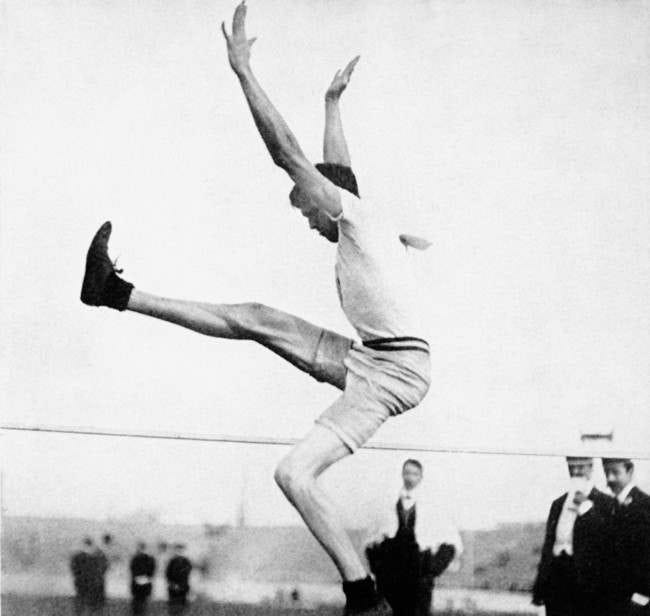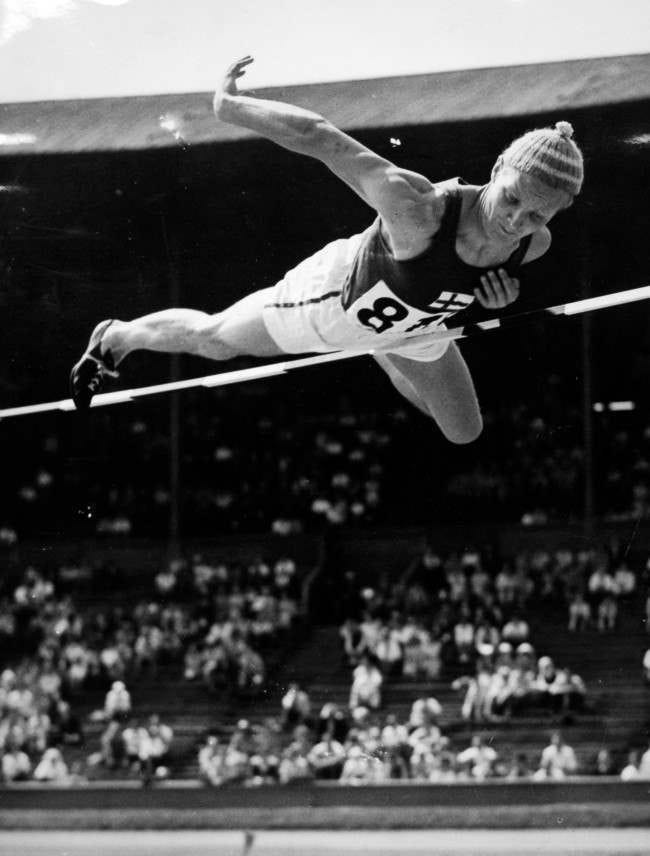The Flop That Changed Everything: Reinvention, Resilience, and the Courage to Flip the Script
Three books can change your Thursday. One book can change your world.
Hello,
I’ve never set foot on a track and field venue. I’ve never attended a high school or college meet. I couldn’t tell you the exact dimensions of a shot put circle or what a discus weighs.
But there is one event—one moment in track and field history—that’s changed how I see the world.
The high jump.
The high jump is simple at first glance: run, leap, clear the bar. For nearly 80 years, jumpers did it the same way—face-first, with strength, speed, and sheer will.
The scissors kick.
The Western roll.
The straddle technique.
All slight variations on a theme: get over the bar, keep your head down, follow the playbook
Then came Dick Fosbury.
1968. Mexico City Olympics.
A lanky engineering student from Oregon. He stepped up to the bar—and turned everything backwards. Literally.
He ran in at an angle, curved his path, and launched himself backward over the bar, head-first and spine-arched, like someone falling into a question mark.
The crowd gasped. Some laughed. Some were stunned. But all of them watched history happen.
Because Dick Fosbury didn’t just win gold that day. He redefined possibility.
The Fosbury Flop, as it came to be known, wasn’t flashy for the sake of it—it was physics. It wasn’t rebellion—it was reinvention.
It was a reminder that sometimes the most powerful thing we can do is trust ourselves enough to do it differently.
And I think about that a lot.
Not because I’m trying to clear a bar. But because I often find myself in situations where the “standard way” doesn’t feel right. And I imagine you do too.
You’re working hard. Showing up. Trying to make things work. But something about the old playbook just doesn’t fit anymore. And it’s tempting to keep doing what everyone else is doing—to go along with the straddle, the scissors, the expected path—because that’s how we were taught.
But what if the only thing keeping us from clearing the bar is the way we’re approaching it?
Dick Fosbury wasn’t stronger than his competitors. He didn’t have better shoes or better coaching. He just had the courage to listen to his body. To trust what felt natural. To be willing to look strange before he looked brilliant.
That’s the lesson I carry.
Because doing things differently doesn’t guarantee you a gold medal. But it does guarantee something else: ownership of your life.
Fosbury’s story is a reminder that innovation doesn’t have to be loud.
It can be quiet. Awkward. Personal.
It can start with failure—again and again—until you find a way that finally works.
And when it does? It changes everything. Not just for you, but for everyone who comes after.
Every high jumper since has gone over the bar backwards.
I think of that when I watch my son play baseball and tweak his swing on his own, trusting his instincts. I think of that when I see a friend start over after 25 years in a career that no longer fits. I think of that when I make a choice that no one else understands, but somehow I know it’s right.
Because sometimes the highest leap doesn’t come from trying harder—it comes from seeing the bar differently.
From having the courage to turn around, arch your back, and jump.
Welcome to this week’s Three Book Thursday.
1. Memoir
Open: An Autobiography
Summary
Some books hit you like a clean return serve—unexpected, sharp, and right on the line. Open is one of them.
Before I read it, I thought I knew Andre Agassi: tennis prodigy, denim shorts, long hair, world champion. But this book peels back the surface to show a far more complex, tortured, and ultimately human story. It’s not just about tennis—it’s about identity, pressure, resilience, and learning to live on your own terms.
From a young age, Agassi was shaped—some might say forced—by a father obsessed with greatness. A homemade ball machine named “The Dragon” became both his training partner and tormentor. He hated tennis. That’s the twist. The thing he was world-class at, the thing that made him famous, was the very thing he resented. That contradiction drives this book—and makes it unforgettable.
But what makes Open resonate with me, and likely with many of you, is how Agassi wrestles with his own expectations and limitations. He falters, rebels, self-destructs—and then rebuilds. Again and again. It’s about the pursuit of authenticity in a world that rewards performance. He doesn’t glamorize the victories or hide from the failures. He lays it all bare: the loneliness, the drug use, the broken relationships, the self-doubt.
And still—he shows up.
That’s the message I took from this book. You don’t need to love the process every day. You don’t need to be perfect. But you do need to keep showing up. And over time, if you’re honest with yourself, if you lean into discomfort, if you stay in the ring—you can create a life that feels like your own.
For anyone navigating career transitions, dealing with burnout, facing internal battles, or simply trying to figure out what comes next, Open offers a mirror. It’s a story of struggle—but also one of growth, reinvention, and quiet triumph.
Agassi’s greatness didn’t come from loving tennis. It came from the work he did off the court: facing his demons, choosing connection over perfection, and finding meaning beyond the scoreboard.
That’s a lesson worth holding on to.
Favorite Quote, Insight, & Principle
Quote: “To be inspired is great, but to inspire is incredible.”
Insight: Remember this. Hold on to this. This is the only perfection there is, the perfection of helping others. This is the only thing we can do that has any lasting meaning. This is why we're here. To make each other feel safe.
Principle: People think hard work is the answer to everything. But sometimes, it’s letting go that changes everything.
Author: Andre Agassi
Themes: Memoir, Tennis, Peak performance
2. Personal development
Poor Charlie’s Almanack: The Essential Wit and Wisdom of Charles T. Munger
Summary
There are books you enjoy, books you admire—and then there are books that sharpen your mind like a whetstone. Poor Charlie’s Almanack is that kind of book.
It’s not flashy. It’s not trendy. But it’s one of the most practical, grounding, and intellectually rich books I’ve ever read. In fact, it may hold the record for the most notes I’ve ever taken from a single book.
Charlie Munger, the quiet genius behind Warren Buffett and Berkshire Hathaway, isn’t interested in clever tricks or shortcuts. He’s interested in clarity. In judgment. In getting things right. And this book distills decades of his mental models, life philosophy, and investment wisdom into one hefty, timeless volume.
What I love about Charlie is that he doesn’t just talk about money. He talks about how to think. His concept of worldly wisdom—pulling from multiple disciplines like biology, history, psychology, physics, and economics—has changed the way I approach problems. He teaches that insight doesn’t live in silos. You have to zoom out. You have to connect the dots across domains if you want to make better decisions.
Charlie’s also someone I want my kids to study. Not just because he’s brilliant—but because he’s wise. He’s lived a life anchored in discipline, humility, and brutal honesty. He’s walked away from shady deals. He’s been slow to anger and quick to listen. He’s played the long game, in business and in life. Alongside Buffett, he’s a blueprint for rational, ethical, long-term thinking.
This isn’t a book to fly through. It’s a book to return to—again and again—whenever you feel pulled toward noise, complexity, or ego.
Because at its core, Poor Charlie’s Almanack isn’t just about investing. It’s about living with intention. It’s about seeing clearly. And most of all, it’s about avoiding the preventable mistakes that sabotage most people—not because they weren’t smart enough, but because they fooled themselves.
Charlie never forgets that we are the easiest people to fool. That’s why his wisdom matters.
This book won’t just teach you how Charlie Munger thinks. It will teach you how to build a life worth thinking about.
Favorite Quote, Insight, & Principle
Quote: “Don't do cocaine. Don't race trains. And avoid AIDS situations.”
Insight: Mimicking the heard invites regression to the mean.
Principle: When you borrow a man's car, you always return it with a full tank of gas.
Author: Charlie Munger
Themes: Personal development, Living a full life, Human psychology, Philosophy, Business
3. Entrepreneurship
The 10X Rule: The Only Difference Between Success and Failure
Summary
The 10X Rule is a blunt, unfiltered reminder that most people drastically underestimate what it takes to succeed. According to Grant Cardone, the biggest mistake isn’t setting goals too high—it’s setting them too low and failing to take the kind of massive, relentless action required to achieve them. The premise is simple, but the execution demands a mindset shift: whatever your goal is, multiply it by ten. Then multiply the effort by ten, too.
This isn’t about hustle for hustle’s sake. It’s about refusing to play small. About realizing that the distance between where you are and where you want to be isn’t just about talent, luck, or timing—it’s about intensity. About discipline. About showing up with energy most people would call insane.
Cardone pulls no punches. He’s not writing a gentle guide to work-life balance—he’s throwing cold water on your excuses. And in today’s world, where mediocrity is often repackaged as “good enough,” his voice is a wake-up call. A reminder that if your dreams don’t demand more than you’re currently giving, they’re probably too small.
This book is for the person who’s tired of waiting for the right moment. For the person who’s got something burning inside them but keeps holding back. For the one who knows deep down they’re capable of more—more output, more impact, more boldness—but hasn’t flipped the switch yet.
Set goals that scare you. Take action that surprises even you. Stop assuming success is supposed to feel comfortable. It’s not. And that’s what makes it worth chasing.
Favorite Quote, Insight, & Principle
Quote: “Fear is a sign that you are doing what's needed to move in the right direction. ”
Insight: The 10X Rule is about pure domination mentality. You never do what others do. You must be willing to do whatever they won't do-and even take actions that you might deem unreasonable.
Principle: It is impossible to take big actions if you don't take responsibility. It is equally impossible to do something positive when you are spending your time making excuses.
Author: Grant Cardone
Themes: Entrepreneurship, Growing a business, Product development, Marketing
Sometimes the biggest leaps in life don’t look like leaps at all. They look like quiet decisions made in private. A small pivot. A choice to try it your way—even if it doesn’t make sense to anyone else.
That’s the through line here.
Fosbury didn’t just change a sport. He challenged a mindset. He proved that tradition isn’t always wisdom—that progress often starts by looking strange.
And that’s the part we forget.
We spend years absorbing expectations. We learn how to succeed, how to perform, how to follow what works. But at some point—whether in our work, our relationships, or the quiet corners of our lives—we face a moment when the old way no longer fits.
That’s when you decide.
Do you keep pushing forward the way you’ve been told? Or do you pause, listen to your own rhythm, and make a different move?
Agassi didn’t find peace by mastering tennis—he found it by being honest about who he was. Munger didn’t build his life by chasing trends—he built it by thinking clearly and acting slowly. And Cardone? He just reminded us that most limits are self-imposed.
But it all comes back to the same thing:
Real growth doesn’t always mean pushing harder. Sometimes it means stepping back, seeing the landscape clearly, and giving yourself permission to approach it in a way only you can.
That’s the invitation this week.
To stop asking how high the bar is—and start asking if the way you’re jumping still makes sense.
Always ❤️📚💡
Three Book Thursday is free, but there are many costs to create these posts each week. So, can you do me a favor?
If you find value here, please support the newsletter.
Or,
Please share Three Book Thursday with a friend, college, family member, or post it to your socials. I’m working hard to grow this audience, but let’s be honest—you’re probably better at it than I am.
Or, do both!










